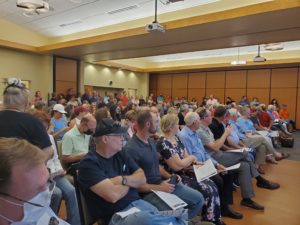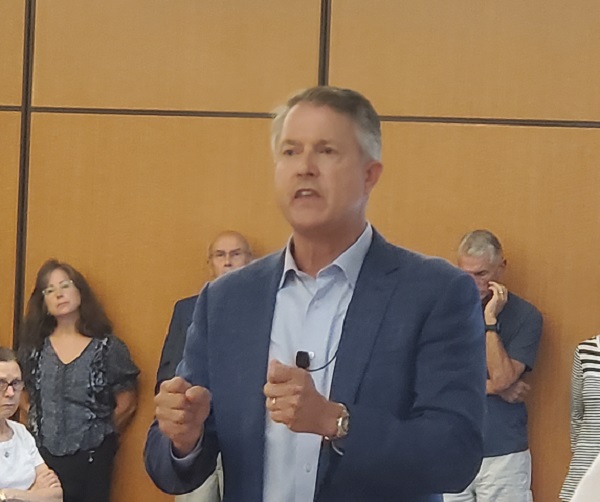The questions came hot and heavy for U.S. Sen. Roger Marshall on Saturday.
What are you doing to get “political prisoners” out of jail for participating in the Jan. 6 riots at the Capitol?
What can be done about President Joe Biden’s vaccine mandates?
Can you stop the massive spending bills in Congress?
What will you do settle political discord in the country?
Should there be a forensic audit of Kansas elections?
How do you define critical race theory?
Those were among the questions that Marshall faced Saturday as he made a swing through eastern Kansas, making town hall stops in Johnson and Wyandotte counties, which Democrat Barbara Bollier won in her losing bid for the U.S. Senate.
Marshall largely had friendly audiences although several times he was pressed for more specific answers from questioners.
On occasion, Marshall had to cut off audience members – for the sake of saving time – whose questions sometimes went well beyond a minute or two and started to take on the form of speeches.
Marshall’s audience at the National Agricultural Center and Hall of Fame in Bonner Springs numbered about 60 while more than 200 turned out in Olathe.
The audience in Olathe was louder, often cheering questions and answers they agreed with whether it related to critical race theory, lifting the debt ceiling or the president’s handling of immigration.

Marshall began the day in Bonner Springs where one of the first questions he fielded came from a woman who asked what he was going to do to get “political prisoners” out of jail for storming the Capitol on Jan. 6.
Marshall said his office took a “deep, deep dive” into the issue.
He said there were six Kansans arrested in connection with the Jan. 6 riots, including four who were released immediately on their own recognizance.
Another had to post a bond to be released and one remains in custody in a mental health facility because they pose a threat to themselves and others.
“I think that maybe it’s been exaggerated a little bit in the media. I know it’s hard to guess that, but certainly, we’ve taken a good look at all the Kansans,” he said.
Marshall was later asked whether he endorsed the cause of the demonstrators who planned a rally for Saturday to show their support for the Jan. 6 protesters who rioted at the Capitol.
“I think Jan. 6 was a horrible day,” Marshall said. “I’m against all riots, all vandalism, not just the riot of Jan. 6, I’m against all the riots across the country…
“I have not paid that much attention to tell you exactly what their cause is,” he said.
“But they certainly have a right of freedom of speech and a right to protest and I pray to goodness that it’s peaceful and they stay away from the Capitol.”
As it turned out, up to 450 protesters turned out for the rally under a heavy security presence in Washington D.C. Saturday, less than the 700 that had been expected.
“That was not an insurrection,” one member of the audience said of the Jan. 6 riots in response to the question. “If they want so seen an insurrection…”
At that point, Marshall immediately said he didn’t want to argue and turned to another questioner who wanted to know what the senator was doing to calm the political unrest that has surfaced during the pandemic.
Marshall responded by saying the country can’t defund the police.
“The slippery slope is that we have an administration that believes in open borders, defunding the police and turns their head away from law and toward disorder.
“If we encourage people to vandalize, encourage people to tear down statues then I think that’s the opposite,” he said.
“I think this administration has a great disrespect for law and order,” he said.
The woman pressed Marshall again, “I’m asking you what you can do.”
Marshall responded, “I answered the question. I’m going to support law and order.”
In Olathe, Marshall was directly asked about his understanding of critical race theory, an issue that’s bubbling up in school board races in Kansas and nationally.
“I want to know your understanding of C-R-T,” a woman in the audience asked Marshall. “I want to know what you think it is.”
Marshall described it as a “Marxist theory” when he was stopped in mid-sentence by a round of applause from the audience.
He continued, “I think it’s Marxist theory that teaches our kids to hate themselves, hate each other and hate this nation.”
The answer wasn’t sufficient.
“I need to know how. I want to know what it is,” she said as other members in the audience grumbled. “How does critical race theory impact our children?”
Marshall stood by his answer, which drew even more applause.
“I think I answered your question,” the senator said. “I just said it. It teaches them to hate themselves, hate each other and hate this country.”
Also in Olathe, Marshall was asked whether he would support a “forensic audit” of Kansas elections similar to what was undertaken in Arizona.
He said that was a decision that was best up to the Kansas Legislature.
“I think we have one of the highest election integrities in the entire nation,” Marshall said, “but if your state legislature decides they want do it, it’s not my call to decide.”
Even some who agree with Marshall politically on issues such as vaccine mandates were not happy that more wasn’t being done.
One woman, who said the government didn’t have the right to extort or coerce the public to take the vaccine, asked Marshall why he wasn’t doing more to oppose the president’s vaccine mandate.
“I want to know what you are doing as a doctor with the other doctors in Congress. Why don’t we hear your voices. We do not hear them,” she said.
“Nobody is saying anything about this mandate and we are scared to death,” she said.
Marshall made it clear that he’s been out front against vaccine mandates but added that he has favors vaccines, adding that he and other family members have been inoculated.
“I think we really have been as loud as anybody pushing against vaccine mandates,” he said.
But when Marshall said he supported people getting the vaccine, the woman responded, “But why?”
“I am favor of people getting the vaccine,” he said. “If you haven’t had the vaccine, I would encourage you to talk to your doctor.”













